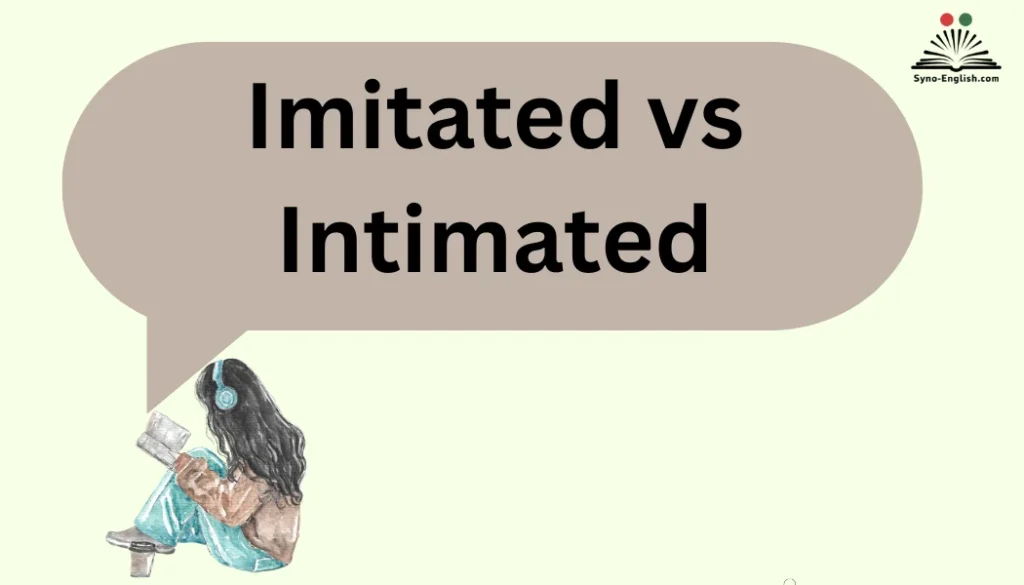When studying English, I noticed that confusion often arises from words that look alike, especially pairs like imitated and intimated. The phrase Imitated vs Intimated reflects how two words can share a similar structure yet stand further apart in meaning than most people expect.
Even experienced learners can trip over these interchangeable terms. This article takes a deep dive into their differences, with examples, comparisons, and clear distinctions to help you understand how they truly differ.Having taught language for many years, I often explore definitions, origins, and contexts to make sense of such tricky terms.
My students learn through memory tricks—for instance, knowing that “imitated” means to copy someone, while “intimated” means to hint or suggest quietly. These simple strategies turn a test of vocabulary into an enjoyable exercise in knowledge and confidence building. It’s not about memorizing but about feeling the rhythm of how language works.
Why Imitated and Intimated Cause Confusion
Many learners and even native speakers stumble over these terms because:
- They look almost identical: Just one letter separates them.
- They sound somewhat similar when pronounced quickly.
- Their usage frequency differs: “Imitated” is common in daily life, while “intimated” often appears in formal or literary settings.
For example, someone might write, “She intimated her teacher’s style,” when what they really meant was imitated. This tiny slip changes the entire meaning.
The Verb Imitate
At its core, to imitate means to copy or mimic someone’s actions, style, or behavior. It’s a word used constantly in conversations about learning, creativity, or even criticism.
- Origin: From the Latin imitari, meaning “to copy” or “mimic.”
- Part of speech: Verb.
- Definition: To take or follow as a model.
Examples in Daily Life
- Children often imitate their parents’ speech patterns.
- An artist might imitate the brushstrokes of Van Gogh.
- Comedians earn laughs by imitating celebrities.
Common Phrases with Imitate
- Imitate someone’s accent
- Imitate nature (in design or architecture)
- Imitate behavior
Quote to note: Aristotle once said, “Man is the most imitative creature in the world, and learns at first by imitation.”
The Noun Imitation
When the verb transforms into a noun, the meaning expands. Imitation refers to the act of copying or the product that results from it.
- Definition: A thing intended to simulate or copy something else.
- Connotation: Can be flattering or derogatory, depending on context.
Examples
- In fashion: an imitation leather jacket
- In art: an imitation of a famous painting
- In food: imitation vanilla extract
Nuances
- Positive sense: A tribute to greatness.
- Negative sense: Suggests something fake or inferior.
| Word | Meaning | Example |
| Imitate (verb) | To copy | The student imitated the teacher’s writing style. |
| Imitation (noun) | A copy or replica | The necklace was an imitation pearl. |
The Verb Intimate
Here’s where the plot thickens. Unlike imitate, the verb intimate means something entirely different: to hint, suggest, or communicate indirectly.
- Origin: From Latin intimare, meaning “to make known” or “to announce.”
- Part of speech: Verb.
- Definition: To say or suggest something in a subtle way.
Examples
- The manager intimated that layoffs might be coming.
- She intimated her interest without saying it outright.
- The novel’s ending intimates that a sequel may follow.
Related Synonyms
- Suggest
- Hint
- Imply
- Allude
Notice the difference: imitated copies, while intimated suggests.
Other Forms of Intimate
Unlike imitate, the word intimate has multiple lives.
As an Adjective
Meaning: close, personal, or private.
Examples:
- An intimate friendship built on trust.
- An intimate dinner for two.
- Sharing intimate details about one’s life.
As a Noun
Though rare, an intimate refers to a close friend or confidant.
Example: Only his intimates knew the real story behind the decision.
This versatility adds to the confusion. When you see “intimate,” the context is everything.
Side-by-Side Comparison: Imitated vs Intimated
The easiest way to lock these words in memory is to see them next to each other.
| Word | Part of Speech | Core Meaning | Example Sentence |
| Imitated | Verb | Copied or mimicked | The child imitated her brother’s dance moves. |
| Imitation | Noun | A replica or copy | The store sold an imitation diamond. |
| Intimate (verb) | Verb | To hint or suggest | He intimated that he might resign soon. |
| Intimate (adjective) | Adjective | Close, personal | They had an intimate conversation. |
| Intimate (noun) | Noun | A close friend | She trusted only her intimates with the secret. |
Mnemonics to Remember
- Imitate → Copy (both words start with “i” and have a “tate/tate” rhythm).
- Intimate → Hint (both have a soft, subtle sound).
- Think: “She imitated the teacher. He intimated the news.”
Common Mistakes and How to Avoid Them
- Using intimate when the intended meaning is imitate.
- Confusing intimate as a verb vs as an adjective.
- Assuming imitation always means fake, when sometimes it signals admiration.
Editing Checklist
When proofreading your writing:
- Ask: Am I talking about copying? Use imitated.
- Ask: Am I talking about hinting or closeness? Use intimate.
- Re-read aloud. If the sentence feels off, it might be the wrong word.
Practical Usage Guide
Here are sample sentences to solidify your understanding:
Sentences with Imitated
- The dog imitated its owner’s hand gestures.
- She imitated her favorite singer during karaoke.
- They imitated successful strategies from other companies.
Sentences with Intimated
- The professor intimated a change in grading policy.
- He intimated his feelings through poetry.
- The coach intimated that more training sessions were on the way.
Quick Quiz
Choose the correct word:
- The student ______ his mentor’s research style.
- The CEO ______ that new regulations would affect operations.
- She wore an ______ silk blouse.
- Only his closest ______ knew about his plans.
Answers: 1. imitated 2. intimated 3. imitation 4. intimates
Case Study: How Confusion Affects Writing Quality
A legal document once stated: “The party imitated their intention to terminate the agreement.”
- The intended word was intimated.
- Result: The meaning flipped from “hinted at” to “copied,” creating a serious miscommunication.
In professional writing, using the wrong term can undermine credibility. Precise language ensures clarity.
Conclusion
Mastering the difference between Imitated vs Intimated is a rewarding step for any English learner. Both words may look alike, but their meaning and context stand further apart than expected. Understanding how they differ builds linguistic confidence and helps avoid everyday confusion. When you imitate, you copy someone or something, but when you intimate, you suggest or hint quietly. Such subtle distinctions make communication precise, expressive, and impactful. With continuous practice, examples, and simple memory tricks, you can strengthen your knowledge and ensure you never mix them up again.
Moreover, language growth comes from curiosity and exploration. Every time you explore definitions, origins, and contexts, your understanding deepens. As a learner or teacher, taking a deep dive into such pairs improves both vocabulary and confidence. Language learning isn’t just about memorization; it’s an enjoyable exercise in discovery. Once you start noticing these patterns naturally, you’ll see that the process of mastering similar words is not a test of difficulty but a journey toward fluency. Keep challenging yourself through quizzes, comparisons, and mindful reading—you’ll never confuse imitated and intimated again.
FAQs
What does “imitated” mean?
It means copying someone’s actions, style, or behavior closely or exactly.
What does “intimated” mean?
It means to hint, suggest, or express something subtly without saying it directly.
Why are imitated and intimated confusing?
Because they look similar but have completely different meanings and uses.
How can I remember the difference easily?
Use memory tricks—“imitate” means copy, while “intimate” means hint quietly.
Can both words be verbs?
Yes, both are verbs but describe entirely different actions.
Are imitated and intimated interchangeable?
No, they are not interchangeable due to different meanings and contexts.
How can I practice using these words correctly?
Create sample sentences and test yourself through quick quizzes.
Why is context important with such words?
Context shows whether the sentence means copying or suggesting something indirectly.
What are common mistakes learners make?
Mixing them up due to similar spelling and sound, without noticing meaning.
What’s the best way to master such pairs?
Keep exploring examples, practicing regularly, and focusing on sentence-level understanding.

Emma Brooke is a passionate English educator, writer, and language enthusiast with over a decade of experience helping learners master the nuances of the English language. At SynoEnglish, she blends practical grammar advice with real-world communication tips to make English easier, clearer, and more enjoyable for readers of all levels.



